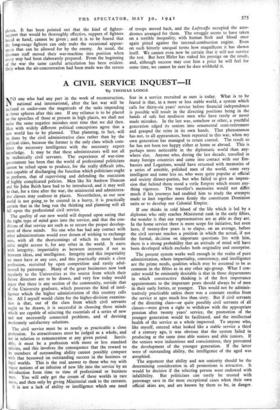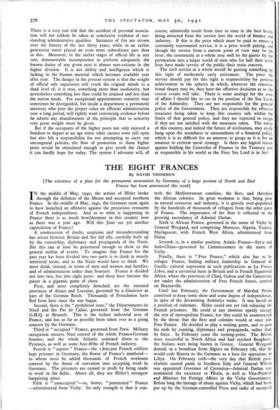A CIVIL SERVICE INQUEST II
13y THOMAS LODGE
NO one who had any part in the work of reconstruction, national and international, after the last war will be inclined to under-rate the magnitude of the tasks impending in those spheres after this one. If any reliance is to be placed on the speeches of those at present in high places, we shall not make the same negative mistakes next time that we did then. Men with widely different political conceptions agree that a new world has to be planned. That planning, in fact, will be done by the civil administrative class rather than by the political class, because the former is the only class which com- bines the necessary intelligence with the necessary expert knowledge. Ii may be that these administrators will not all be technically civil servants. The experience of war-time government has been that the world of professional politicians cannot be relied upon to produce, for the really difficult jobs, men capable of discharging the function which politicians ought to perform, that of supervising and defending the execution of highly complicated policies. Men like Sir Andrew Duncan and Sir John Reith have had to be introduced, and it may well be that, for a time after the war, the ministerial and administra- tive classes may coalesce in places. Nevertheless, as our new world is not going, to be created in a hurry, it is practically certain that in the long run the thinking and planning will all fall upon the professional civil service.
The quality of our new world will depend upon seeing that the right type of mind goes into the service, and that the con- ditions of that service are such as to secure the proper develop- ment of those minds. No one who has had any contact with other administrations would ever dream of wishing to exchange ours, with all the shortcomings of which its most hostile critic might accuse it, for any other in the world. It starts with integrity, impartiality as between interests if not as between ideas, and intelligence. Integrity and this impartiality we must have at any cost, and this practically entails a close profession, recruited by open competition and rarely adul- terated by patronage. Many of the great businesses now look regularly to the Universities as the source from which their future directors are to be drawn, and very few today would argue that there is any section of the community, outside that of the University graduate, which possesses the kind of intel- ligence which the higher administration of this country calls for. All I myself would claim for the higher-division examina- tion is that, out of the class from which civil servants ought to be drawn, it is successful in choosing those minds which are capable of selecting the essentials of a series of new and not necessarily connected problems, and of devising moderately satisfactory solutions.
The civil service must be as nearly as practicable a close profession. Its attractiveness must be judged as a whole, and not in relation to remuneration at any given period. Inevit- ably, it must be a profession with more or less standard salaries, and this involves the consequence that the reward to its members of outstanding ability cannot possibly compare with that bestowed on outstanding success in the business or legal worlds. This is the real answer to those who toy with vague notions of an infusion of new life into the service by an introduction from time to time of professional or business men. You will only get the cream of these worlds in rare cases, and then only by giving Ministerial rank to the entrants.
It is not a lack of ability or intelligence which one need fear in a service recruited as ours is today. What is to be feared is that, in a more or less stable world, a system which calls for thirty-six years' service before financial independence is possible will result in the directing positions being in the hands of safe but mediocre men who have rarely or never made mistakes. In the last war, somehow or other, a youthful generation edged its seniors into ornamental semi-retirement and grasped the reins in its own hands. That phenomenon has not, to all appearances, been repeated in this war, when my own generation has managed to retain control. The result so far has not been too happy either at home or abroad. This is perhaps more noticeable in the diplomatic world than any- where else. Anyone who, during the last decade, travelled in many foreign countries and came into contact with our Em- bassies and Legations, would have returned with memories of a series of amiable, polished men of the world, some very intelligent and some less so, who were quite popular at official and society dinner-parties, but who failed to give an impres- sion that behind them stood a virile Empire which meant any- thing vigorous. The traveller's memories would not differ much if his journeys had enabled him to study the attempts made to knit together more firmly the constituent Dominion units or to develop our Colonial Empire.
If one thinks in cold blood of the life which is led by a diplomat who only reaches Ministerial rank in the early fifties, the wonder is that our representatives are as able as they are. In the home service there is more scope for initiative, but even here, if twenty-five years is to elapse, on an average, before the civil servant reaches a position in which the actual, if not the formal, decision on important questions lies with him, there is a strong probability that an attitude of mind will have been developed which excludes both originality and enterprise.
The present system works well enough in the realm of pure administration, where impartiality, consistency, and intelligence are the prime needs, qualities which may be assumed to be as common in the fifties as in any other age-group. What I con- sider would be eminently desirable is that in those departments in which constructive thinking is of the first importance appointments to the important posts should always be of men in their early forties, or younger. This would not be adminis- tratively practicable unless there was a constant exodus from the service at ages much less than sixty. But if civil servants of the directing class—or quite possibly civil servants of all classes—were given a right to withdraw with the appropriate pension after twenty years' service, the promotion of the younger generation would be facilitated, and the intellectual health of the service as a whole improved. To anyone who, like myself, entered what looked like a stable service a third of a century ago, it was obvious that the system failed in producing at the same time able seniors and able juniors. If the seniors were industrious and conscientious, they prevented the development of the younger generation. If the latter were of outstanding ability, the intelligence of the aged was atrophied.
The argument that ability and not seniority should be the determining consideration in all promotions is attractive. It would be decisive if the selecting person were endowed with infallibility. But politicians can rarely be misted with patronage save in the most exceptional cases when their own official skins are, and are known by them to be, in danger. There is a very real risk that the accident of personal associa- tion will not seldom be taken as conclusive evidence of out- standing administrative qualities. Instances of this are strewn over the history of the last thirty years, while in an earlier generation merit played an even more subordinate part than in this. Moreover, in the earlier stages of official life at any rate, demonstrable incompetence to perform adequately the known duties of any given post is almost non-existent in the higher division. It is not ability and intelligence which is lacking in the human material which becomes available year after year. The danger in the present system is that the weight of official safe experience will crush the original minds to a dead level of, it is true, something more than mediocrity, but nevertheless something less than could be attained and less than the nation needs. For exceptional appointments seniority may sometimes be disregarded, but inside a department a permanent secretary who puts the proper value on efficient administration over a long period, will rightly want convincing evidence before he admits any abandonment of the principle that to seniority very great weight must be given.
But if the occupants of the higher posts not only enjoyed a freedom to depart at an age when other careers were still open but also felt a responsibility for not attempting to carry out uncongenial policies, the flow of promotion to those higher posts would be stimulated enough to give youth the chance it can hardly hope for today. The system I advocate will, of course, admittedly result from time to time in the best brains being attracted from the service into the world of finance and industry. If this is the price which must be paid to ensure a constantly rejuvenated service, it is a price worth paying, and though the service from a narrow point of view may be the loser, the community as a whole may well be the gainer by the permeation into a larger world of men who for half their adult lives have made service of the public their main concern.
The civil service as a whole would be gaining something by this right of moderately early retirement. The price the service should pay for this right is responsibility for positive achievement in the spheres in which, whatever the constitu- tional theory may be, they have the effective decisions as to the course events will take. There is some analogy for the state of affairs I should like to see in the position of the Sea Lords of the Admiralty. They are not responsible for the general policy of the Government. They are responsible for effective measures being taken to keep this country safe within the limits of that general policy, and they are expected to resign if they are not satisfied with the measures taken. The safety of this country, and indeed the future of civilisation, may easily hang upon the soundness or unsoundness of a financial policy, which it is as difficult for an amateur to gauge as it is for an amateur to criticise naval strategy. Is there any logical reason against holding the Controller of Finance in the Treasury just as responsible in his world as the First Sea Lord is in his?































 Previous page
Previous page